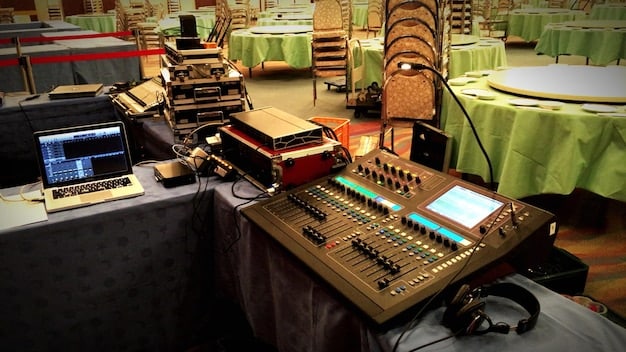Get Your Rock Music on the Air: A Guide for Emerging Artists

Emerging Rock Artists aiming for radio airplay in the US can significantly increase their chances by creating high-quality recordings, understanding radio formats, networking strategically, and utilizing digital promotion to build a dedicated fanbase and industry connections.
For emerging rock artists, getting your music featured on rock radio stations in the US can feel like summiting a mountain. It’s not just about having a great song; it’s about understanding the landscape and navigating the path to airplay. This guide provides actionable steps to help you on your journey.
Understanding the US Rock Radio Landscape
Navigating the world of rock radio in the US requires understanding its diverse ecosystem. From major commercial stations to college and internet radio, each outlet caters to different audiences and offers unique opportunities.
Commercial Rock Radio
Commercial rock stations are the giants of the industry, broadcasting to vast audiences and wielding considerable influence. These stations are highly selective, prioritizing established artists and proven hitmakers. However, breaking into this realm is possible with a strategic approach.
College and University Radio
College and university radio stations are often more receptive to emerging artists and independent music. These stations provide a platform for diverse sounds and are frequently on the cutting edge of musical trends.
Internet Radio
Internet radio has exploded in popularity, offering a vast array of genres and subgenres. Many internet radio stations are dedicated to supporting independent artists, providing a valuable avenue for exposure.
- Research Target Stations: Identify stations that align with your specific rock subgenre.
- Understand Playlists: Analyze the playlists of target stations to gauge whether your music fits their format.
- Consider Geographic Reach: Target stations in regions where your fanbase is strongest.

Understanding the nuances of each radio format is crucial for tailoring your approach and maximizing your chances of airplay. Each station has unique preferences and priorities, so doing your homework is essential.
Creating High-Quality Recordings
In today’s saturated music market, high-quality recordings are non-negotiable. Your music must sound professional and polished to compete with established artists on the airwaves. This involves every step of the production process, from songwriting to mixing and mastering.
Professional Recording
Consider working with experienced recording engineers and producers who specialize in rock music. A skilled professional can help you capture the energy and essence of your songs while ensuring technical excellence.
Mixing and Mastering
Mixing and mastering are crucial steps in the production process. A well-mixed song will have a balanced sound, with each instrument clearly audible. Mastering adds the final polish and ensures that your music sounds its best on any playback system.
Invest in Quality Equipment
If you’re recording at home, invest in high-quality microphones, audio interfaces, and monitoring systems. While expensive equipment doesn’t guarantee success, it can significantly improve the sound of your recordings.
- Songwriting: Develop strong, memorable songs with hooks that grab listeners’ attention.
- Arrangement: Craft dynamic arrangements that build and release tension effectively.
- Performance: Deliver passionate and engaging performances that convey the emotion of your music.
Creating high-quality recordings is an investment in your career. It demonstrates your commitment to your craft and increases your chances of being taken seriously by radio stations and listeners alike.
Networking and Building Relationships
The music industry is built on relationships, and networking is essential for getting your music heard. Attending industry events, connecting with radio programmers, and building genuine relationships with other musicians can open doors to opportunities that would otherwise be inaccessible.

Attending Industry Events
Industry events such as music conferences, showcases, and festivals provide valuable opportunities to network with industry professionals, including radio programmers, music supervisors, and journalists.
Connecting with Radio Programmers
Identifying and connecting with radio programmers at target stations can be challenging, but it’s crucial for getting your music on their radar. Attend station events, follow them on social media, and try to establish a personal connection.
Building Relationships with Other Musicians
Collaborating with other musicians and building a supportive network within the music community can lead to valuable cross-promotion opportunities and referrals.
- Be Professional: Always present yourself in a professional manner, both online and in person.
- Be Respectful: Treat everyone you meet with respect, regardless of their position in the industry.
- Be Persistent: Don’t give up easily. Building relationships takes time and effort.
Networking is an ongoing process that requires patience, persistence, and genuine connection. By building strong relationships within the music industry, you can significantly increase your chances of getting your music featured on rock radio stations.
Understanding Rock Radio Formats
Rock radio isn’t a monolith; it encompasses several sub-formats, each catering to a specific audience and taste. By understanding these nuances, emerging rock artists can tailor their approach for optimal exposure.
Active Rock
Active Rock typically features current hard rock and alternative metal. Bands like Foo Fighters, Shinedown, and Disturbed are staples. If your music leans towards heavier riffs and aggressive vocals, Active Rock stations may be a good starting point.
Classic Rock
Classic Rock focuses on the iconic bands and anthems from the 1960s, 70s, and 80s. While generally resistant to new music, some stations may feature emerging artists who capture the spirit of classic rock without sounding derivative.
Alternative Rock
Alternative Rock includes a wide range of styles, from indie rock to modern rock. This format often embraces innovation, making it a viable option for emerging artists with a unique sound.
- Alignment is Key: Target the format that naturally suits your music; don’t try to force a fit.
- Station Research: Listen closely to your target stations to understand their playlists and audience.
- Personalization: When contacting stations, reference specific songs or artists they play to show you understand their format.
Understanding rock radio formats allows you to focus your efforts, increasing your chances of landing airplay on stations that will resonate with your target audience.
Crafting Your Pitch for Radio Stations
Submitting your music to radio stations requires more than just sending a track; it demands a well-crafted pitch that grabs their attention. Think of it as your concise introduction—an opportunity to explain who you are and why your music deserves a spot on their airwaves.
Your Email Subject Line
The subject line is the first impression. It should be attention-grabbing but professional. Include keywords like “[Artist Name] – New Single Submission” or “[Genre] Artist Seeking Airplay.” Clear, concise language increases the odds of your email being opened.
Personalize Your Message
Avoid generic, mass-distributed emails. Research the program director or music director you’re contacting, mention a recent artist they’ve supported, and explain why your music is a great fit for their station specifically. Show that you’ve done your homework.
Include Essential Information
Provide a brief bio covering your background, recent achievements, and any notable press coverage. Include a concise description of your music, highlighting its themes and influences. Provide streaming links to your best tracks.
- Quality Matters: Ensure your music is professionally mixed and mastered.
- Keep It Short: Radio professionals are busy, so keep your pitch concise.
- Follow Up: A polite follow-up email after a week or two can demonstrate your interest.
Your pitch is your sales pitch. Make it compelling, concise, and tailored to the radio station’s unique identity.
Leveraging Digital Promotion
In the digital age, promoting your music online is just as important as traditional methods. Building a strong online presence and engaging with your fanbase can create buzz and attract the attention of radio stations. Consider these approaches:
Social Media Marketing
Use social media platforms like Facebook, Instagram, and Twitter to connect with fans, share your music, and promote upcoming shows and releases. Engage with your followers and create a sense of community around your music.
Email Marketing
Build an email list and use it to notify fans about new releases, tour dates, and other important news. Email marketing allows you to communicate directly with your most dedicated supporters.
Online Advertising
Consider running targeted advertising campaigns on social media and search engines to reach new listeners who are likely to enjoy your music.
- Create Engaging Content: Share behind-the-scenes videos, live performances, and other content that gives fans a glimpse into your world.
- Run Contests and Giveaways: Offer incentives to encourage fans to share your music and engage with your brand.
- Collaborate with Influencers: Partner with music bloggers, vloggers, and other influencers to reach new audiences.
Monitoring Airplay
Once you’ve secured airplay, it’s essential to monitor its impact. Tracking airplay data can provide valuable insights into your audience reach, geographic distribution, and the effectiveness of your promotional efforts.
| Key Point | Brief Description |
|---|---|
| 🎸 Quality Recordings | Invest in professional recording for a polished sound. |
| 🤝 Networking | Build industry relationships to open doors. |
| 📻 Radio Formats | Understand rock radio sub-genres to target effectively. |
| 📣 Digital Promotion | Leverage social media and online ads to grow your fanbase. |
FAQ
A radio-ready song typically features a catchy hook, high-quality production, and a runtime suitable for radio formats. It should also align well with the station’s specific genre and target audience.
Professional mastering is crucial, ensuring your track sounds its best on any sound system. Radio stations often have strict audio quality standards, making mastering a must for achieving optimal loudness and clarity.
Research the station’s submission guidelines, then send a personalized email to the music director. Include a brief bio, a link to your best tracks, and explain why your music fits their format.
Build a strong online presence, create high-quality recordings, network with industry professionals, and tailor your pitch to each specific radio station. Engage with your local scene to build support.
Starting with local stations is often a good strategy, as it allows you to build a regional fanbase and gain experience. Success at the local level can then be leveraged to attract the attention of larger, national stations.
Conclusion
Getting your music featured on rock radio stations in the US is a challenging but achievable goal for emerging rock artists. By focusing on creating high-quality recordings, understanding radio formats, networking strategically with industry professionals, and leveraging digital promotion, you can significantly increase your chances of airplay and build a thriving music career.





